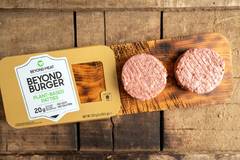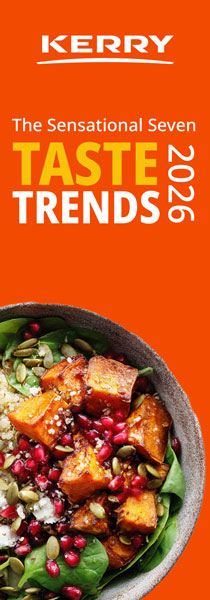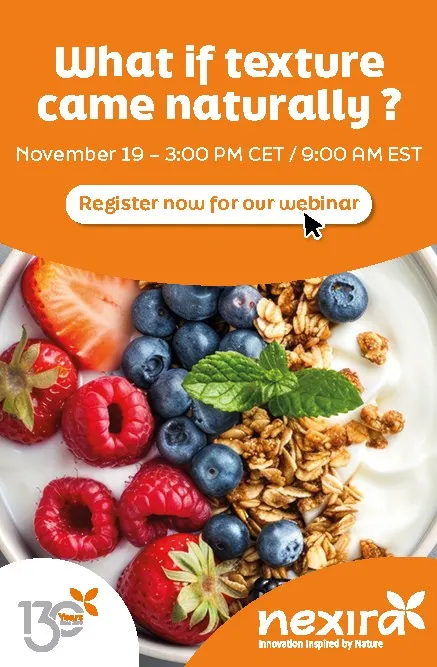Revo Foods and Paleo leverage fermentation-based myoglobin to enhance plant-based seafood
Revo Foods has joined forces with Paleo, a Belgian company that taps into yeast to formulate animal-free myoglobin. The project partnership has received €2.2 million (US$2.38 million) in funding from the EU to help the companies develop innovative myoglobin for vegan salmon using Paleo’s precision fermentation and Revo Foods’ 3D structuring technologies.
In an in-depth interview with Food Ingredients First, Robin Simsa, CEO and co-founder of Revo Foods and Hermes Sanctorum, CEO of Paleo, delve into the two-year project that aims to develop myoglobin “designed to mimic salmon” in taste and appearance for seafood substitute applications.
Myoglobin — a heme protein — is considered crucial for meat’s taste and nutritional value. Originally found in animal muscle tissue, fermentation can produce it. These proteins give many types of fish and meat their characteristic taste, color, iron-rich content and the typical aroma when cooking and roasting.
Revo Foods plans to integrate Paleo’s myoglobin into its 3D-structured vegan salmon filet alternative recipe.

 Many people do not feel the need to buy alternatives to salmon, which is why Revo Foods markets its product differently, says CEO Robin Simsa.“Heme proteins are really interesting because even with a small amount, they can make a huge difference in terms of sensory perception. Paleo is a leader in this field of producing these proteins with precision fermentation. We were absolutely convinced by their technical capabilities in improving the taste of alt protein products by including heme protein,” says Simsa.
Many people do not feel the need to buy alternatives to salmon, which is why Revo Foods markets its product differently, says CEO Robin Simsa.“Heme proteins are really interesting because even with a small amount, they can make a huge difference in terms of sensory perception. Paleo is a leader in this field of producing these proteins with precision fermentation. We were absolutely convinced by their technical capabilities in improving the taste of alt protein products by including heme protein,” says Simsa.
“In this project, Paleo will develop a new salmon-based myoglobin protein and Revo Foods will do tests with different ingredients and processing conditions to test the effect that myoglobin has on improving the taste of a salmon filet alternative. The funding will go directly into financing these R&D activities.”
For Sanctorum, the partnership enables the companies to combine their expertise for delivering a product that “redefines plant-based seafood.”
“These funds will allow us to develop the specific salmon protein, scale up the process and fine-tune the sensory properties needed to integrate seamlessly into Revo Foods’ 3D-printed salmon. Ultimately, this support will enable us to bring a more authentic and sustainable seafood alternative to the market faster and more efficiently.”
Eurostars, an international funding program that supports small and medium-sized enterprises working on innovative products, has facilitated the funding. The initiative is co-funded by the EU through Horizon Europe, the EU’s key funding program for research and innovation.
Why myoglobin?
Sanctorum explains that myoglobin is key to replicating the umami flavor that makes seafood so appealing.
 Paleo develops beef myoglobin, complemented with species such as chicken, pork, tuna and even mammoth (Image credit: Paleo).“It’s what gives plant-based salmon its authentic taste, making it as close to real fish as possible. By using precision fermentation, we recreate salmon myoglobin to ensure our product delivers the sensory experience consumers expect without compromising quality.”
Paleo develops beef myoglobin, complemented with species such as chicken, pork, tuna and even mammoth (Image credit: Paleo).“It’s what gives plant-based salmon its authentic taste, making it as close to real fish as possible. By using precision fermentation, we recreate salmon myoglobin to ensure our product delivers the sensory experience consumers expect without compromising quality.”
Additionally, myoglobin is important for the flavor of animal products and adding it to plant-based products can potentially have huge effects on the “overall likeliness of these products for mainstream consumers,” underscores Simsa.
While Revo Foods utilizes mushroom protein (fermented mycelium) in its vegan salmon formulations to naturally enhance fish filets’ flakiness and tender mouthfeel, he expects myoglobins will elevate these effects. Adding myoglobin will also improve the products’ nutritional value, particularly the iron and protein content.
Combining fermentation and 3D structuring
Paleo brews animal proteins by using yeast through precision fermentation, Sanctorum tells us.
“We instruct the yeast to make our animal protein simply by introducing a piece of DNA code for myoglobin into the yeast cell. What’s so unique about our process is that our yeast releases the proteins into its environment.”
“This is called extracellular secretion and allows us to produce a food ingredient that does not contain any genetically modified material, satisfying regulators’ and consumers’ demands for foods that are free of GMOs,” he explains.
 Paleo’s heme proteins can be used in a wide range of plant-based meat alternatives besides seafood, says CEO Hermes Sanctorum.Revo Foods will utilize these proteins in its vegan salmon filet, which it unveiled last year as the first 3D-printed mycoprotein fish product using its patented 3D-MassFormer technology. The company later launched a high-precision extrusion system for mass production and customization of 3D-printed meat alternatives.
Paleo’s heme proteins can be used in a wide range of plant-based meat alternatives besides seafood, says CEO Hermes Sanctorum.Revo Foods will utilize these proteins in its vegan salmon filet, which it unveiled last year as the first 3D-printed mycoprotein fish product using its patented 3D-MassFormer technology. The company later launched a high-precision extrusion system for mass production and customization of 3D-printed meat alternatives.
With 3D structuring technology, multiple materials can be integrated into each other, such as fats into a protein component, like the white stripes in Revo Foods’ vegan filet.
Consumer acceptance
So far, Simsa has observed a positive reaction to Revo Foods’ current salmon filet product but acknowledges that to really convince the mass market, even more “meaty” taste attributes need to be enhanced.
“It is certainly a communication issue. Many people do not feel the need to buy alternatives to salmon, which is why we market our product differently.”
“For us, the main marketing message is the healthy fermentation-based mycelium ingredients, which are high in fiber, protein and omega-3. We communicate to consumers that this is a very healthy product which can be used in similar recipes like a salmon filet, but that it is different and has value on its own,” he explains.
Plant-based brands also need to communicate more to consumers why they should buy their products — by emphasizing their taste and nutritional value — instead of why they should not buy animal-based products.
“Just the beginning”
Simsa adds that Revo Foods plans to incorporate heme proteins into its products in the future if the tests are successful and Paleo gets regulatory approval. Otherwise, the company’s main focus will be on upscaling the production capacity of its 3D food-printing facility The Taste Factory, which it opened in Vienna last month.
 Amid a positive reaction to Revo Foods’ salmon filet, Simsa sees a need for even more “meaty” taste attributes for elevating consumer appeal.Meanwhile, Sanctorum underscores that while Paleo awaits regulatory approvals, the firm will continue to innovate and refine its fermentation processes while exploring new food applications.
Amid a positive reaction to Revo Foods’ salmon filet, Simsa sees a need for even more “meaty” taste attributes for elevating consumer appeal.Meanwhile, Sanctorum underscores that while Paleo awaits regulatory approvals, the firm will continue to innovate and refine its fermentation processes while exploring new food applications.
“The partnership with Revo Foods is just the beginning — we see our myoglobin as a key ingredient in reshaping various food categories, helping to drive a more sustainable and diverse food system.”
“We’re actively engaging with industry leaders and potential customers through strategic collaborations and ongoing outreach, building a network to bring our solutions to market,” he concludes.
















